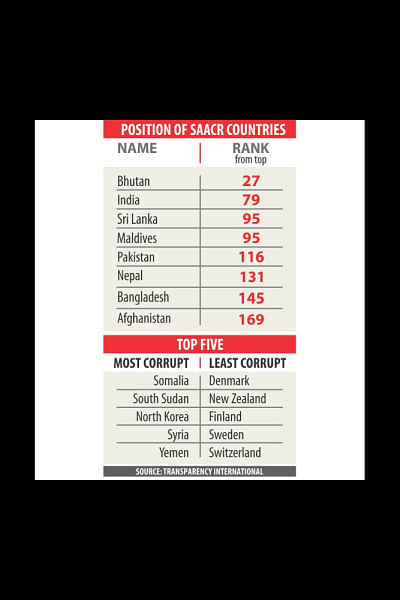Two notches up, 15th from bottom

Bangladesh's position in the global Corruption Perceptions Index of Transparency International has remained almost static over the last five years, with the country still far from the global average score.
The magnitude of corruption in the country is alarming though it moved two notches up in the CPI-2016 as revealed by the Berlin-based graft watchdog yesterday.
Among the 176 countries surveyed, Bangladesh ranked 145th from the top, and 15th from the bottom -- two steps up from the 13th position among 169 countries surveyed in 2015.
This time, it scored 26 out of 100 points, one point higher than last year's.
Bangladesh's score hovered between 25 and 27 and its rank between 13th and 16th since the TI introduced '0 to 100' score scale in 2012, instead of '0 to 10' scale.
The countries are arranged from least corrupt to worst corrupt in the index, and the one with the highest score is the least corrupt and sits at its top.
Transparency International, Bangladesh shared the findings of the global survey at a press conference at its office in the capital's Dhanmondi yesterday.
Asked about the reason behind the country's almost static position, TIB Executive Director Dr Iftekharuzzaman said the main reason for failing to move upward faster is that the institutional, legal and policy structures created to strengthen the state's anti-corruption potentials remain far from being effectively enforced and practised.
"Corrupt people, especially those having links with power and politics enjoy collusive protection and hence an informal impunity," Iftekharuzzaman told The Daily Star.
Other institutions meant for ensuring accountability under the national integrity system have been weakened by a monopolisation of political space, he said.

"The space for freedom of speech and opinion is also perceived to have been curtailed which is counterproductive to democratic practice and conducive to flourishing of corruption and culture of impunity," he added.
The TI has been publishing the report every year since 1995. The index is based on perceived level of corruption in public sectors and misuse of public office or position.
Bangladesh was included in the index in 2001. The country was at the bottom of the TI scale for five years from 2001 to 2005.
CPI-2016
At the press conference, Iftekharuzzaman said Denmark and New Zealand scored the highest -- 90 -- to top the 2016 list of least corrupt countries. As in the previous year, Somalia became the worst corrupt country with a score of only 10.
In South Asia, Bangladesh remained second after Afghanistan from the bottom, and shared its position with Cameron, Gambia, Kenya, Madagascar and Nicaragua.
Iftekharuzzaman said Bangladesh is still far from achieving the global average score of 43.
"Our position is not good. I say it's alarming. Our position is only better than Afghanistan in South Asia which is embarrassing for us. We must overcome the situation," he said.
TIB Chairperson Sultana Kamal said, "It gives us a bit of relief that we have not gone backwards. But we should not take the fight against corruption lightly because we are not in a position to be happy."
Iftekharuzzaman said Bangladesh's rating in corruption perception this year is based on findings gathered from seven globally-reputable survey sources against a minimum requirement of three. No data generated by any of TI's local chapter was considered for the analysis or global rating.
The analysis was based on data collected from January 2015 to September 2016.
Iftekharuzzaman said the reason the country managed to make a little progress in the ranking is "the positive perception of potentials for stronger legal, institutional and policy capacity to control corruption".
"But we could have done better," he said.
The reasons why Bangladesh remains “at low level” include non-fulfilment of the government commitment to curb corruption, weakening institutions of accountability due to monopolisation of political space, deficit in effectiveness and independence of the Anti-Corruption Commission, shrinking space for the media and civil society, and absence of trial of cases of corrupt high-profile persons.
He, however, said the ACC is now more active under the new chairman.
In order to do better, the government and the other stakeholders have to show political will to deliver on the pledges and bring the corrupt people to justice irrespective of their status or identity, said Iftekharuzzaman.
Effective institutions, professional integrity and impartiality of public service, administration and law-enforcement agencies, and strong law and policy to control conflict of interest are also essential.
Increased space has to be ensured for citizens, the media, civil society and NGOs so that they can raise voice against corruption, he added.
TIB trustees M Hafizuddin Khan and Ali Imam Majumder, Deputy Executive Director Sumaiya Khair and Director (outreach and communication) Rezwan-ul-Alam were also present.

 For all latest news, follow The Daily Star's Google News channel.
For all latest news, follow The Daily Star's Google News channel. 



Comments